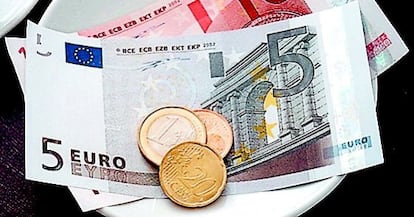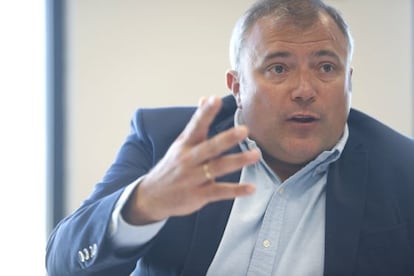Why cash is still king in Spain
Only 20 percent of all consumer purchases are made with credit cards, says Mastercard

Spaniards have a deep-rooted culture of using ready money, in part driven by the country’s huge hidden economy, and that makes people in the country averse to using credit cards. That’s according to the head of a leading credit card company in Spain.
“Around 80 percent of private purchases are made in cash, with only 20 percent going through electronic payment systems such as cards and bank transfers,” says Ovidio Egido, the managing director of Mastercard’s Spanish operations
Central bank data shows that some €111 billion was withdrawn from cash machines in Spain last year
The figures are in stark contrast with countries such as Sweden Denmark and Finland, where the figure is inverse, or Germany and the United Kingdom, where 60 percent of payments are electronic.
Central bank data shows that some €111 billion was withdrawn from cash machines in Spain last year, with €105 billion spent on cash purchases.
Mastercard is looking into the controversy raised by CaixaBank’s decision to charge non-customers a €2 commission for using its cash machines, pointing out that the guidelines the banks should follow include ensuring that the extra charge is justified, and that banks are not charging twice for the same service. “This no longer happens because they have adapted their information technology systems,” he explains.
Egido says he supports the government’s recent measures to prevent cash payments of more than €3,000, as well as requiring explanation of the origin of payments and transfers of more than €10,000 into bank accounts. “In the rest of the European Union, €3,000 in cash is considered a large amount,” he says, pointing out that up to 25 percent of Spanish GDP is made up by “the hidden economy.”

Unsurprisingly, Mastercard and other payment companies support greater use of cards, arguing that this is the direction in which the advanced economies of the world are moving. “Denmark plans to end the use of cash completely. In Spain it is now possible to pay at parking meters with credit cards, as well as in taxis. Even a couple of years ago this was unthinkable. It is clear that this is one way to limit the hidden economy and this benefits everybody in society. What’s more, cash costs shops an extra 3.5 percent. They might not factor it in to their running costs, but it adds up in terms of security, time spent organizing change, lost cash, etc.”
Egido says that perhaps Spaniards are still fearful of creating a society where financial transactions take place through credit cards or transfers, seeing it in terms of Big Brother. “But if you look at countries like the United Kingdom, credit cards are even used to pay out social benefits – these cards cannot be used to buy alcohol or luxury goods. In this case, the card is a clear help,” he explains. At the same time, he points out that 92 percent of people in Spain have bank accounts, “although we tend to think everybody has a current account. But in the future, those excluded from the system will be those who do not have internet access.”
In Spain it is now possible to pay at parking meters with credit cards, as well as in taxis. Even a couple of years ago this was unthinkable”
Many people do not know that their cards are supported by an international payment network. These systems, particularly Visa and Mastercard, allow users to pay abroad with cards, as well as on the internet. As they have no relationship with the end customer, but with the intermediary, which is the bank, they have looked to raise their profile through sponsorship, particularly of sporting events. Following the FIFA bribes scandal, Mastercard has pointed out that it has not sponsored FIFA since 2007, and sponsors UEFA instead.
Mastercard is now introducing payment via smartphone and contactless cards. “These are payment methods used by few people so far, but the two means are growing rapidly because they are both comfortable and safe,” says Egido, adding that 0.02 percent of payments are fraudulent. “That is irrelevant,” he explains. Egido praises the digitalization of Spanish banking, and says that Apple, Google and Paypal represent a danger, and could “become the main suppliers of services, with banks relegated to second place. It would not be easy, but it is possible,” says the managing director of a company that has carried out 11 billion transactions between January and March of this year, making a profit of more than €2 billion for that period.
Tu suscripción se está usando en otro dispositivo
¿Quieres añadir otro usuario a tu suscripción?
Si continúas leyendo en este dispositivo, no se podrá leer en el otro.
FlechaTu suscripción se está usando en otro dispositivo y solo puedes acceder a EL PAÍS desde un dispositivo a la vez.
Si quieres compartir tu cuenta, cambia tu suscripción a la modalidad Premium, así podrás añadir otro usuario. Cada uno accederá con su propia cuenta de email, lo que os permitirá personalizar vuestra experiencia en EL PAÍS.
¿Tienes una suscripción de empresa? Accede aquí para contratar más cuentas.
En el caso de no saber quién está usando tu cuenta, te recomendamos cambiar tu contraseña aquí.
Si decides continuar compartiendo tu cuenta, este mensaje se mostrará en tu dispositivo y en el de la otra persona que está usando tu cuenta de forma indefinida, afectando a tu experiencia de lectura. Puedes consultar aquí los términos y condiciones de la suscripción digital.









































